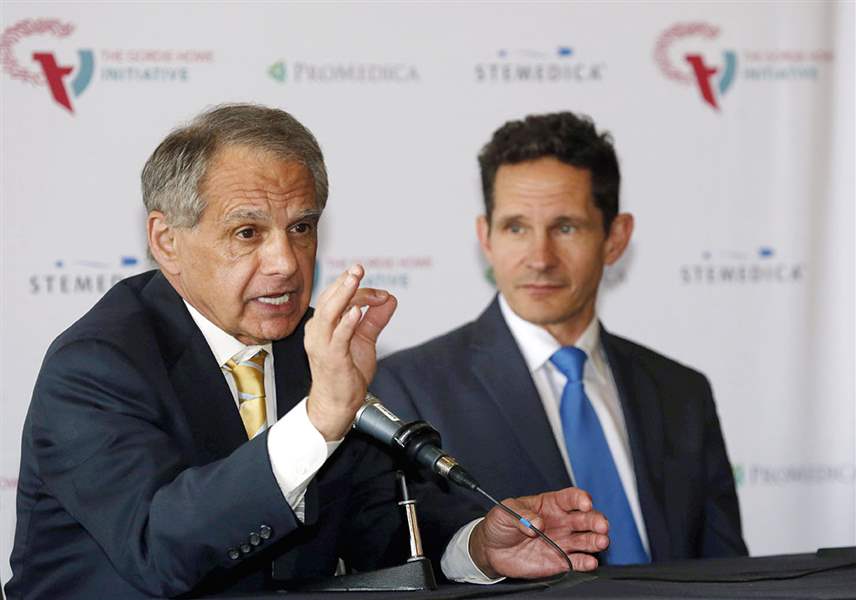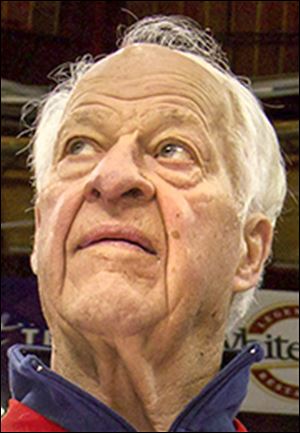
GORDIE HOWE TEAMS UP WITH RESEARCHERS
ProMedica study to target traumatic brain injuries
Hockey star raises awareness of stem-cell therapies
5/12/2016
Dr. Joseph Maroon, vice chairman of the department of neurosurgery at the University of Pittsburgh, and Dr. Murray Howe, director of sports medicine imaging at ProMedica Toledo Hospital, discuss local research of traumatic brain injuries.
THE BLADE/LORI KING
Buy This Image

Dr. Joseph Maroon, vice chairman of the department of neurosurgery at the University of Pittsburgh, and Dr. Murray Howe, director of sports medicine imaging at ProMedica Toledo Hospital, discuss local research of traumatic brain injuries.
Hockey legend Gordie Howe is honored to have his name attached to new research on the use of stem cells to treat traumatic brain injuries, said his son, Dr. Murray Howe.
Dr. Howe represented his father at a news conference Wednesday announcing a new partnership between ProMedica and a California stem-cell company that will kick off with a yearlong adult stem-cell clinical trial.
The Toledo health system is joining forces with Stemedica Cell Technologies Inc. to create the Gordie Howe Initiative at ProMedica Toledo Hospital. The effort is being funded initially by the health system and Stemedica. ProMedica officials, however, would not disclose the exact amount of the company’s financial contribution to the project.

Gordie Howe
The goal is to raise an additional $32 million from private donors to continue research on traumatic brain injuries after the first clinical trial ends in early 2018.
“It’s truly a historic day for me and for the Howe family,” Dr. Howe said. “This initiative is something I think that will help be a lasting legacy for him that will potentially help people’s quality of life for decades to come.”
Mr. Howe’s star power is raising awareness in the United States and Canada about advances in stem-cell therapies as he continues what is being called a “miraculous” recovery from a massive stroke.
The 88-year-old former Detroit Red Wings player could have died if he had not traveled in 2014 to a medical clinic in Tijuana, Mexico, for an experimental stem-cell treatment not yet available in the United States, said his personal physician, Dr. Roger Kruse. Dr. Kruse is also a sports’ medicine specialist for ProMedica.
The hockey great, who suffers from dementia, now lives in Sylvania with his son.
“We keep it fun for him every day. He has about four or five good hours every day. He actually comes here [Inverness Club] and goes putt-putting on the practice greens,” said Dr. Howe, who is director of sports’ medicine imaging for Toledo Hospital.
Dr. Kruse will be the principal investigator for the clinical trial using adult stem cells in traumatic brain injury patients. A nine-member, scientific advisory board will supervise the clinical research and helped to design the clinical trial.
The clinical trial, which is expected to begin later this year, will test whether stem cells supplied by Stemedica can regenerate brain tissue in people who have suffered injuries in car accidents, on the battlefield from bombs, or from sports, Dr. Kruse said.
The stem cells used in the clinical trial were taken from bone-marrow tissue, harvested from an adult donor, and then multiplied in a lab. “With one donor you can do as many as 600,000 treatments,” he said.
The U.S. Food and Drug Administration requires proof that this treatment is safe before authorities will approve its use.
This is the first clinical trial of this type using adult stem cells in brain injury patients in the United States, said Dr. Joseph Maroon, team neurosurgeon for the Pittsburgh Steelers and an adviser for the clinical trial.
It will involve 24 people who are between the ages 18 and 45 years old. To be selected, the participants must have been living with brain injuries for at least six months, but not longer than five years. The participants cannot have a history of cancer, lymphoma, melanoma or suicidal ideas. They will each receive a dose of the stem cells through an intravenous injection.
The goal is for the stem cells to trigger regeneration of cells or the preservation of cells already there, Dr. Maroon said. These cells that “reduce inflammation and inflammation is a major component of the cascade of problems that occur with traumatic brain injury,” he added.
In 2010, about 2.5 million emergency department visits, hospitalizations, or deaths were associated with TBI in the states. according to the Centers for Disease Control. Millions of dollars have been spent to develop drugs to help TBI sufferers, but they have been unsuccessful, Dr. Maroon said.
This is a first step to try a new form of treatment. This is a very bold, aggressive, innovative approach, he said.
The partnership of ProMedica and Stemedica, along with the national stature of Mr. Howe, helped with the selection of Toledo as the location of this brain-injury research, Dr. Kruse said.
“I don't think anything of this magnitude has ever been done in Toledo,” said Dr. Kruse, who called it “cutting edge” research.
FDA guidelines prohibit ProMedica from advertising or directly soliciting people for the study at this point in the process. However, anyone interested in the clinical trial can email ProMedica at research@promedica.org, or contact the research department at 419-291-7820.
. Most of the participants will be patients of Dr. Kruse or referred to Dr. Kruse by other physicians, said Angie Link, director of research at ProMedica.
All government-approved clinical trials are listed on clinicaltrials.gov and this Toledo trial will be on the website sometime later this summer. Those interested in finding it can use the search function on the site and use the words Stemedica or Dr. Kruse, she said.
Once up and running, the study is expected to last about 12 months. It is open to people from across the country, but the preference is for participants who live in the region. They will have to travel to Toledo several times throughout the year and the farther away people live, the less likely they are to continue to participate in the study, Dr. Kruse said.
Depending on the preliminary results from the clinical trial there may be a need for further studies or they may find it didn’t work on brain cell regeneration.
“If this works, it will definitely bring people here for treatment. No question,” Dr. Kruse said.
Contact Marlene Harris-Taylor at: mtaylor@theblade.com, 419-724-6091, or on Twitter @marlenetaylor48.